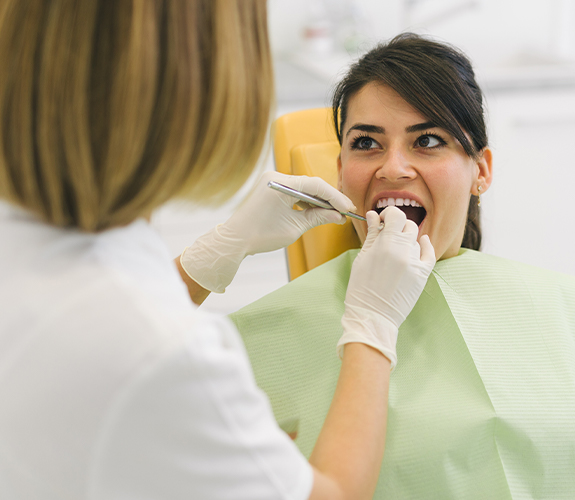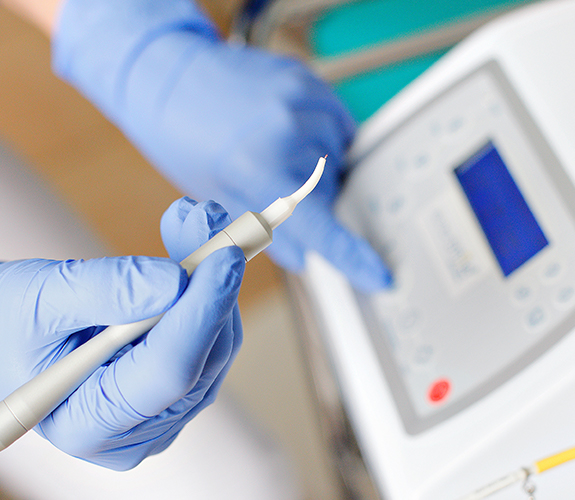
Gum Disease Treatment – Channahon, IL
State-of-the-Art Gum Disease Treatment
There’s nearly a 50/50 chance that you’ll suffer from gum disease in one form or another as an adult. The disease starts mild but can lead to tooth loss if not carefully monitored and controlled. Call us if you notice that your gums have become swollen or bleed easily; we’ll have a better chance of saving your smile if we diagnose the problem early on and providing exceptional gum disease treatment in Channahon, IL!
Why Choose Grand Dental - Channahon for Gum Disease Treatment?
- Pain-Free Laser-Based Therapy
- Fully Customized Gum Treatments
- Two Board-Certified Periodontists
Scaling & Root Planing

Scaling & root planing are both part of the deep cleaning process for reducing bacteria levels in the mouth. After plaque and tartar have been removed from the pockets of the gums, the tooth roots are smoothed out to create a surface that the gums can more easily reattach themselves to.
Soft Tissue Laser Dentistry

Dental lasers help kill the bacteria that cause gum disease, and they can remove gum tissue to stop the infection from spreading. Using a laser allows for better precision and accuracy than a traditional dental scalpel, and it gives us a way to immediately stop exposed blood vessels from bleeding by cauterizing the area.
Advanced Periodontal Procedures
Both of our in-house periodontists have completed extensive training for cosmetic gum surgery, gum grafting, dental implant placement, and other advanced periodontal treatments. Don’t worry about needing to find a specialist; you can find the periodontal care you need right here in a safe, familiar environment surrounded by a friendly team.
Periodontal Disease FAQs
Even though millions of people in the United States alone suffer from periodontal disease, you may still have questions about it. If you are experiencing symptoms associated with gum disease in Channahon and are worried about your oral health, our team here at Grand Dental — Channahon is here to help. Our goal is to have honest and transparent communication with patients when it comes to explaining the process of treatment as well as potential cost and alternative options. Below are some common questions we get about periodontal disease.
How can I avoid periodontal disease?
Fortunately, there are many effective ways to keep periodontal disease at bay. Our team here at Grand Dental — Channahon recommends the following:
- Practice excellent oral hygiene by brushing twice a day, flossing daily, and rinsing with an ADA-approved mouthwash regularly.
- Quitting bad habits and lifestyle choices such as smoking, chewing on ice, and biting your fingernails.
- Eat a balanced diet. Swap out sugary and starchy foods for healthier options like leafy greens, lean proteins, fruits, vegetables, and low-fat dairy products.
Does periodontal therapy hurt?
It does not hurt to undergo periodontal therapy. When you meet with our board-certified periodontist, they will evaluate the soft tissues in your mouth to determine the severity of your case before creating a custom treatment plan.
Once we’ve reviewed the plan with you and are ready to begin, we’ll use a reliable local anesthesia to numb the gums. This ensures you will be comfortable and virtually pain-free.
It’s natural to experience some soreness in the mouth after completing your treatment. However, any symptoms you experience should be easy to manage with at-home remedies like over-the-counter pain relievers and ice packs.
What happens if my teeth cannot be saved?
The early stage of gum disease is called gingivitis, but it can advance into periodontitis if left untreated. At this stage, it begins to attack the jawbone and supportive tissues that hold the teeth in place. If symptoms are severe, it may not be possible to save a patient’s teeth.
In the event that periodontal therapy is not an option, we will need to extract the teeth. From there, we will need to discuss ways to replace the vacated sockets. This can only be done after healing from extraction is complete and periodontitis is brought under control. Then, we can discuss your tooth replacement options, such as dental implants, dentures, or a dental bridge.
Will my dental insurance cover gum disease therapy?
Every dental insurance company is different, but most provide coverage for gum disease therapy. However, we highly recommend that you review the details of your plan to fully understand your benefits and determine how much you can expect to pay out of pocket. Dental insurance policies typically categorize periodontal therapy as either minor or major, which means that they agree to pay anywhere between 50-80% of the total cost. Patients also need to take into account their deductible and annual maximum, as these factors determine how much the insurance provider has agreed to pay. At Grand Dental — Channahon, our knowledgeable team is ready to help patients review their benefits and discover alternative, affordable ways to pay for periodontal therapy.